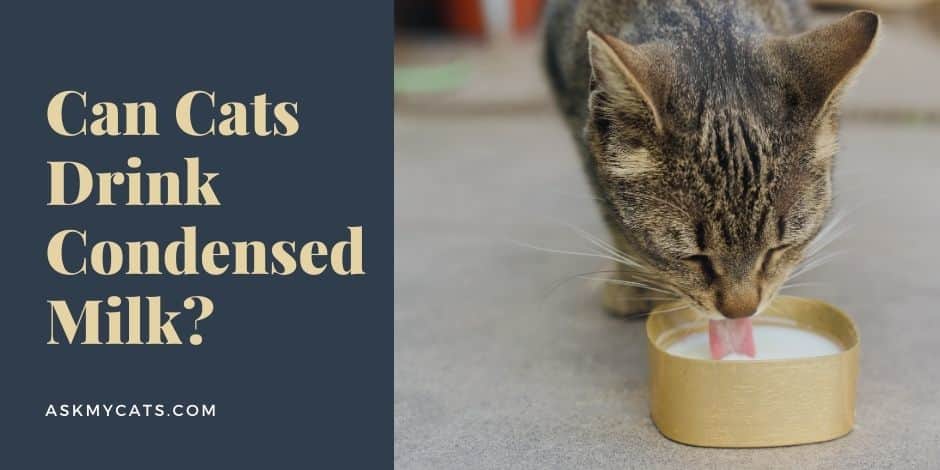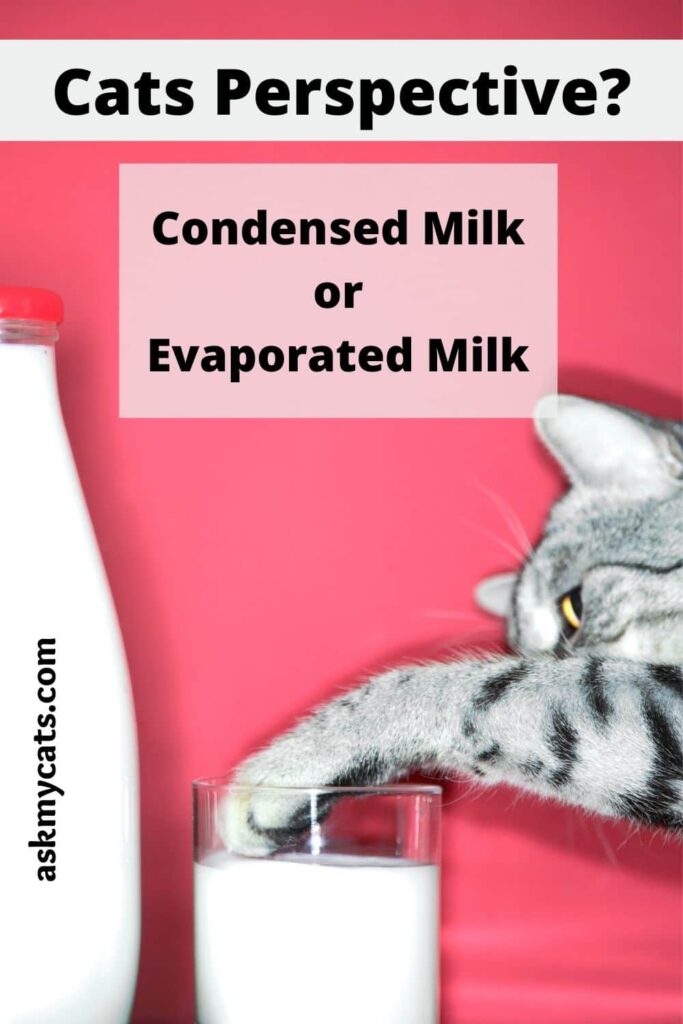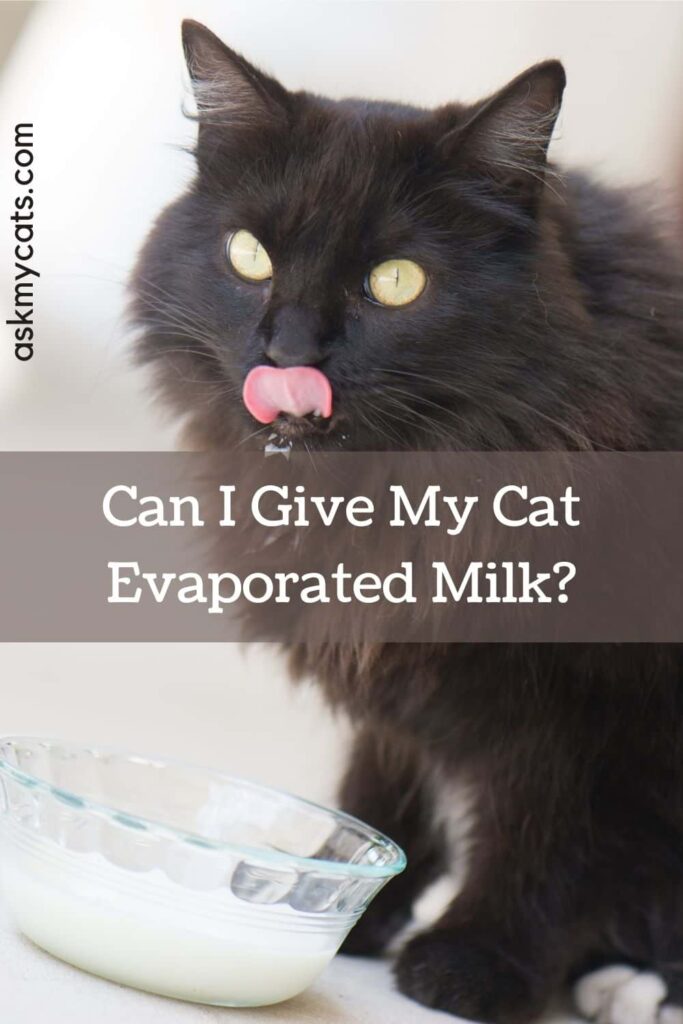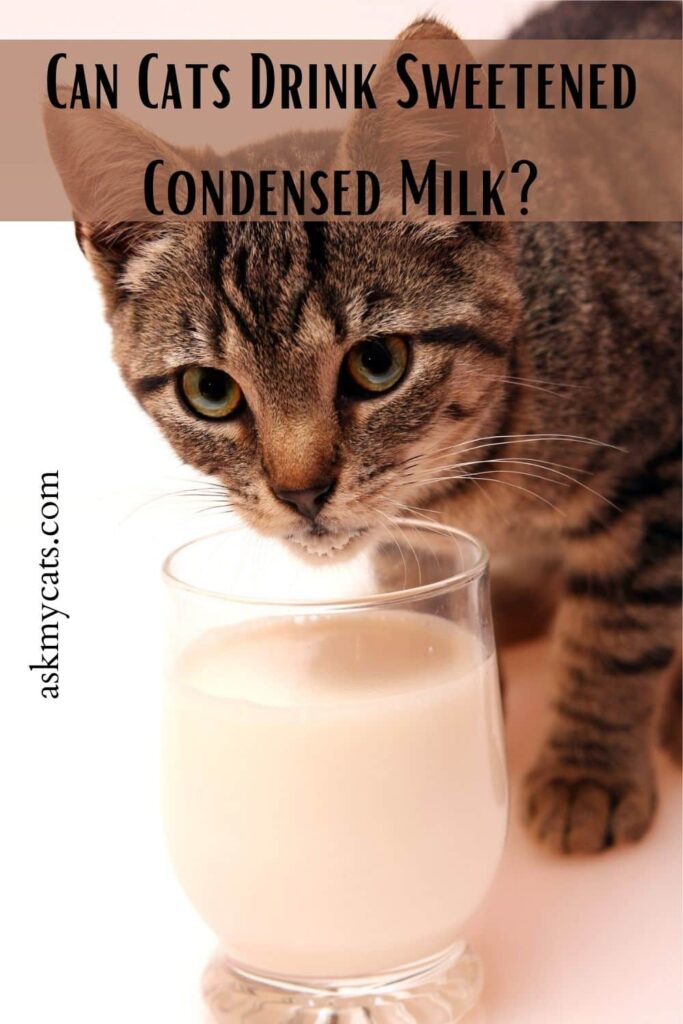Sweetened condensed milk and evaporated milk are both high in sugars and are not recommended at all.
Cats are not usually keen on sweet flavors, but even if your kitty has a sweet tooth it is not advisable to tempt your cat with these.
Condensed/Evaporated milk is heavily processed, and in some cats, it can induce diarrhea. Few cats are lactose intolerant and have trouble digesting milk items.
I wouldn’t recommend it if it’s sweetened condensed milk.
Many cats can accept unsweetened condensed milk or evaporated milk in limited quantities. Whether she vomits or gets diarrhea after swallowing it, I will not give it to her again.


Give Your Cat the Perfect Day
Get the Free Ebook!
Difference Between Condensed Milk And Evaporated Milk: Cats’ Perspective

Giving a cat some evaporated milk sounds like a special treat, and it’s as typical as giving them a mouse to catch, especially if it’s served in a saucer.
However, one fallacy on what we think we know about cats and what they require has found its way into the mainstream.
The simple truth is that evaporated milk is actually cow’s milk that has had a lot of the water extracted, resulting in a creamier and thicker liquid than normal milk.
Any owners may feel that this is a safer choice because it does not contain the sugar contained in condensed milk.
However, neither can be given to a cat because they can induce stomach cramps, diarrhea, and in some cases, vomiting.
As a cat owner, you want to do what’s right for your cat, and cartoons or a common understanding that cats like milk may have perpetuated the myth of feeding them some sort of milk.
However, it turns out that they don’t like it and that it’s not something they need to remain nourished and stable.
Can I Give My Cat Evaporated Milk?

The straight answer to this question would be a big NO! You can not give your cat evaporated milk.
The biggest explanation you shouldn’t feed your cat evaporated milk is because it’s all cow’s milk, and cats have a normal lactose sensitivity.
It’s common knowledge that humans are the only animal that eats the milk of another species, and all of them are lactose intolerant.
As a result, it’s only normal for cats to be unable to absorb cow’s milk, which induces diarrhea and a sore stomach.
A cat in the wild wouldn’t reach for milk for a drink nor would they be able to drink milk after weaning.
Where and when they can find it, they only drink it.
This is why you keep it natural and don’t just give them milk and stick to water.
Also, check out My Cat Loves Oat Milk: Can Cats Drink Oat Milk?
Can Cats Drink Sweetened Condensed Milk? Know The Secret Reasons!
Scientists say the worst milk you can give your cat is sweetened condensed milk, much as cats are bad for evaporated milk.
In these types of milk, high sugars cause the same problems as you find in pasteurized milk.

1. Health Risks
Every cat is a living thing, and some will treat more milk than others. But that does not mean that giving any one of them is a smart idea.
Gastrointestinal pain can be developed by cats who consume milk or milk products. Vomiting and diarrhea, stomach upset, gassiness, and loose stools include.
Giving cats milk is like junk food. The cats will not get adequate protein, since milk dilutes nutrients from the best sources of food.
Research also found that feeding cats milk can have a detrimental influence on their survival, reproductive, bone structure, and development as part of a normal, long-term diet.
Thus, extra sweet condensed milk is usually harmful to cats.
2. Lactose Intolerant
Cats cannot tolerate lactose like most adult mammals. Lactose is normal milk and milky sugar.
This means that an enzyme called lactase is absent and lactose has to be digested. So lactose starts to ferment, which creates a stomach disturbance in the digestive tract.
Kittens produce lactase and can actually treat milk with lactose. But milk is not the calcium, antibodies, and vitamins that cats cultivate.
It is also possible to affect the production of kittens’ milk. Kittens avoid producing lactase after they are weaned from their mothers.
If you have any medical questions for your pet, please seek advice from your veterinarian. Lactose allergy can be handled for a long time by simply excluding milk and dairy products from your cat’s diet.
Any of the symptoms mentioned above may necessitate urgent veterinary treatment to relieve the pain and discomfort.
3. Milk Allergy
Almost a third of cats have been shown to have food sensitivities in tests. Allergies of lactose and casein, a milk protein, are examples of this. Lactose and casein reactions do not affect all cats.
Allergies in cats usually occur as stomach pain or dermatologically as hives or redness on the skin.
Congestion, edema (swelling from fluid retention), degeneration of the villi (small projections from the mucous membranes), hemorrhage, and a rise in plasma cells are all signs of milk allergy in the stomach.
Cat allergies may tend to be extreme, but they can be effectively handled. All you have to do now is keep away from the things that your cat is allergic to!
Can Cats eat ice-creams? Feel free to know.
4. Need Only Water
To satisfy all of their hydration requirements, cats only need a fresh supply of water.
They get all of their other foods from their cat food and don’t need any extra additives or evaporated milk or something. It’s best to leave things as clear as possible.
Instead of incorporating a bunch of different stuff into your cat’s diet, invest the money in the finest cat food you might buy for them. That way, you’ll realize they’re having what they need, and your life would be a lot simpler.
Also, check out Can Cats Drink Warm or Cold Milk? Which One Do They Prefer?
5. Don’t Experiment With Feline Diet
It’s best not to change your cat’s diet too much and to keep things as regular as possible.
This can be tough for us as humans when we try to think like a cat and believe that consuming the same meal and drinking the same beverage every day will become monotonous.
But that’s just because we’ve developed a refined palate and that food has been such an integral part of our lives.
We love not only consuming but also critiquing the ingredients we drink, and many people make a living trying to come up with different flavor combos.
Cats, on the other hand, do not have the same ability to enjoy food; they eat it to survive. When they hear their food being opened, don’t misinterpret that as an indication that they’re ready to eat and they want to savor all of the tastes.
They’re reacting to hunger or maybe a Pavlovian answer if they’re not quite hungry yet. They are completely willing to eat the same thing every day because it fills their appetite.
You can tell that whether the bowl is empty or full, they easily return to their nap or something else they’re doing.
6. Age Is A Factor
Cats will tend to hate milk, particularly when they get older.
If you love your cat’s well-being and your cat isn’t an unweaned, orphaned kitten that should be drinking kitten substitute milk, don’t feed him milk. This argument is confirmed by several publications available on the internet.
Kittens, like all newborn mammals, are born with the capacity to absorb lactose, the primary sugar present in milk.
For young animals, this sugar is a very useful source of nutrition, but lactase, the enzyme that helps them to absorb it, starts to vanish from the gut shortly after weaning.
When an adult cat drinks milk, the indigestible lactose in its gut can ferment, resulting in a stomach upset.
Can you eat food after your cat has licked it? Read here.
7. Chemistry Inside Stomach!
It is preferable to use evaporated milk. Condensed milk is highly sweet, and is harmful to your cat’s health. In any case, it’s not the sugar that pulls her in; evaporated milk mimics the milk of mother cats.
Cats like fatty, viscous milk, and they used to prefer the top of the milk to our insipid supermarket semi-skimmed stuff.
After weaning, cats lose the enzyme in their guts that helps them to digest lactose, but they can maintain it if they want to drink milk.
If your cat has always loved milk, she is unlikely to be affected, as it will at the very least keep her hydrated. When she’s just been adopted, keep a close watch on her.
You can comfortably feed milk to your kitty as long as it’s not sugared. All of the sugar will be devastating. One day, you may have to pay for the care of a diabetic cat.
Of course, the cat loves it because it contains almost 50% sugar. It’s made of milk syrup. That is, however, why it is dangerous to the cat. Try evaporated milk that hasn’t been sweetened.
Also, check out can cats have coconut milk
Frequently Asked Questions
What kind of milk can cats drink?
Cat-Sip Real Milk has exactly what your cats want and nothing they don’t need. Cat-Sip is real, lactose-free 1% low-fat ultra-pasteurized milk fortified with taurine.
Is it OK to give my cat evaporated milk?
Evaporated milk is better. Cats lose the enzyme in their guts that allows them to digest lactose after they’ve been weaned but may retain it if they’ve continued to drink milk. If your cat has always enjoyed milk, she may not suffer any ill effects, and it will at least help keep her hydrated.
What can cats drink besides water and milk?
If your cat will not drink fresh water, then you can try boiling some plain chicken breast or white fish and give your cat the cooking liquid to tempt them. This should not contain any salt or oil. You can also ask your vet whether oral rehydration fluids would be suitable.
Can cats drink water?
Yes, they do. Although movies and other media often show cats drinking a bowl of milk, it’s not good for most felines. Water, however, is as vital to a cat’s survival as it is to that of humans. 60-70% of their body weight is water.
Can kittens drink powdered milk for humans?
NO! Baby formula for humans can give a kitten severe diarrheal attack. Powdered milk for adult humans is even worse. Go to a pet store or a vet and get kitten formula.
Final Words
Do your cats like milk as a special treat?
Have you tried any of the various kinds of milk mentioned here for your cat?
Which one is their personal favorite?
We would be glad if you let us know in the comments section below.
Interesting Read: Can Pregnant Cats Drink Milk?
